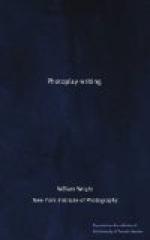DISAPPROVED BY THE NATIONAL BOARD OF CENSORSHIP
The Unwritten Law: The Board does not recognize the so-called unwritten law as a justification for the killing of any being.
Crime: 1. When crime is the obvious purpose of the picture—that is, when the whole story hinges on the perpetrated crime.
2. When the crime is repulsive and shocks the spectator.
3. The shooting in “cold blood” of any being.
4. Any crime that portrays a unique method of execution.
Suicide: The Board will not pass a picture in which there is a suicide or any suggestion of a suicide, with incidents leading thereto. The purpose of the Board is to prevent all suggestion of self-destruction to those who are morbidly inclined.
Burglary: There is no objection to a burglary scene in a picture so long as there is no actual demonstration of the act of burglarizing; for instance, the burglar may be shown entering through an open window, but must not be shown in the act of “jimmying” the window. He may be shown with his back to the audience, opening a safe and extracting therefrom money or papers, but he must not be shown opening the safe by any means known to the art of burglars.
Vulgarity: All vulgarity and suggestion must be avoided. For instance, flirtations with women who are unmistakably of easy virtue. Letters making appointments with such women are objectionable, as is any “rough-house” conduct with them.
Mischief: The Board objects to pictures that will suggest to the mind of youth acts of mischief, such as mutilation or destruction of property for the purpose of perpetrating a joke on someone, especially playing jokes on invalids or cripples.
Lynching: Lynching is only permissible when the incident happens in the days when Lynch Law was the only law, i.e., in the early days of the Far West when the Vigilantes were the only effective means of enforcing order.
2. Other Objectionable Subjects
The foregoing, of course, is not a complete list, as points are coming up continually. For instance, scenes showing kidnapping are forbidden by the police of many cities, and the introduction of that form of crime into a film story is frowned upon by the National Board. The point is that scenes of crime and violence are not absolutely barred, nor are offenses against the moral law, but where permitted these must not be presented offensively, and they must be essential to the story, rather than the purpose of the play. This is a difficult point which nothing but common sense and experience can perfectly interpret.
As an example, a story written about a murder or a robbery will not be passed, but such an incident may be allowed in a story in which it is not the leading feature. In any event, the incident must serve to point a moral and not serve as a spectacle.




